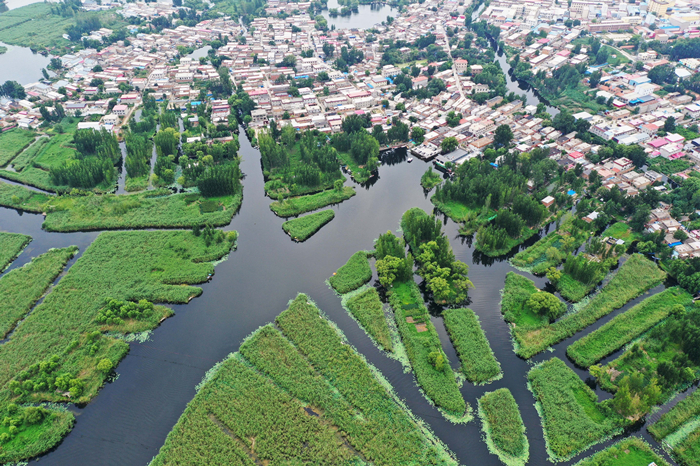|
||||||||||
| Home Nation World Business Opinion Lifestyle ChinAfrica Multimedia Columnists Documents Special Reports |
|
||||||||||
| Home Nation World Business Opinion Lifestyle ChinAfrica Multimedia Columnists Documents Special Reports |
| ChinAfrica |
| China According to President Xi |
| Xi Jinping: The Governance of China, a collection of four books by the Chinese president, is a general reflection on the Chinese political system today |
| By Taling Tene Rodrigue 丨VOL. 14 October 2022 ·2022-09-22 |

A view of Baiyangdian, Xiong’an New Area, Hebei Province, on July 27. Local efforts in ecological preservation and restoration in recent years have greatly improved the environment
The four volumes of the book Xi Jinping: The Governance of China, published in 2014, 2017, 2020, and 2022 respectively, present the official position of the Communist Party of China (CPC) on China’s development in the 21st century, as well as a collection of President Xi Jinping’s thoughts on social life and political philosophy of his country. That’s how we comprehend the volumes from an African perspective.
Socialism with Chinese characteristics
The first book defines “socialism with Chinese characteristics” as a type of socialism that is particularly suited to China’s current situation, and the basis of this ideology is Marxism in its purest form. President Xi promises to maintain and develop the ideals of China’s reform and opening up launched by late Chinese leader Deng Xiaoping, particularly in the face of economic protectionism and unilateralism of the West. Developing countries have praised China’s stance. African countries, for example, are searching for markets to help them with industrialisation and marketing of manufactured products. China possesses more than 20 percent of the global market, whereas Africa accounts for less than 5 percent of global trade. Thus, President Xi’s promotion of further opening up the Chinese market is a huge relief for developing countries.
From the government, the army, and cooperation
The second volume presents Chinese wisdom and solutions for building a community with a shared future for humanity.
President Xi places a high value on advancing the socialist rule of law. People must benefit and be protected by the law. “China’s socialist system ensures that the people assume the principal position as masters of the country. It also ensures that the people are the primary actors in advancing the rule of law. This is a strength of our system, and the fundamental distinction between socialist rule of law with Chinese features and capitalist rule of law,” President Xi writes. This is a powerful message to countries that appear not to comprehend socialist rule of law and have repeatedly attempted to use the human rights card to throw mud at China.
According to President Xi, the military should adhere to Marxist-Leninist principles and uphold the rule of law. The military should adhere to the Party values and engage in self-criticism. Military capability cannot be isolated from political work. Thus, according to President Xi, the soldier must be schooled not only in battle but also in Marxism in order to be a real revolutionary. This is in sharp contrast to the United States, where the only ideological instruction available to soldiers is the law of force.
President Xi refers to the notion of a “new era” in China-Africa cooperation as an adjustment for the current context. China and Africa have had friendship and economic relations for over 2,000 years. President Xi realises the injustice of the global governance system towards Africa and the Third-World countries in this new era of China-Africa relations. He values the continent’s interests, like the African Union’s Agenda 2063, and believes that China can help African countries to complete key infrastructure projects such as those under the Belt and Road Initiative. All of this is codified in the Forum on China-Africa Cooperation, which has evolved into a key platform for communication and consultation between China and African countries.

Staff of a Sunripe factory in Limuru Town, Kiambu County, Kenya, celebrate after loading
the country’s first shipment of fresh avocados to China on August 2
Climate change
The third book concentrates on President Xi’s environmental policy. He calls on all nations to collaborate in order to address the common concerns of climate change and environmental conservation. Climate change, he believes, is a collective challenge.
Indeed, we know that most African nations are still in desperate need of industrialisation, but they face the same international climate policy constraints as developed ones. At the same time, the continent is suffering from the large polluters’ climate concerns. This is really unfair. President Xi is right when he says, “Only together can we effectively address climate change, marine pollution, biological conservation, and other global environmental issues, and achieve the UN 2030 Agenda for Sustainable Development.”
Overall, President Xi’s speeches on ecology and environment in this volume provide a comprehensive picture of the Chinese leaders’ policies and priorities on global issues.
The health crisis
The fourth volume of Xi Jinping: The Governance of China outlines China’s measures from February 3, 2020 to May 10, 2022. The COVID-19 pandemic, on top of global political and economic instability, made this time particularly difficult. The issue of health security has never been more vital to the world than now. Despite the pandemic, China has made every effort to assist the rest of the world, particularly African countries. China has provided almost 2 billion doses of vaccines to help the most vulnerable countries, worked to develop the headquarters of the Africa Centres for Disease Control and Prevention, and assisted the WHO in providing a more comprehensive worldwide response to COVID-19.
In a nutshell, the fourth volume provides ideas to balance the international geopolitical situation, epidemic prevention and control, and economic and social development, effectively prevent and defuse major security risks, and promote the steady and long-term development of global revitalisation.
Xi Jinping: The Governance of China is a collection of principles that may be used to construct a sustainable global order, which is flexible enough to handle the problems that nations face. It provides a unique view on the CPC and its goal of building a successful and peaceful China as a part of the community with a shared future. The volumes also provide actual governance proposals applicable to Western democratic systems, and will undoubtedly aid in properly interpreting the CPC’s governance concepts and ideals. These works will surely serve as educational resources for the international community on China’s ideals, development path, internal and external policies, and response to significant international concerns.
The author is deputy director of the Centre for Francophone Studies, Institute of African Studies, Zhejiang Normal University, China
| About Us | Contact Us | Advertise with Us | Subscribe |
| Copyright Beijing Review All rights reserved 京ICP备08005356号-5 京公网安备110102005860号 |